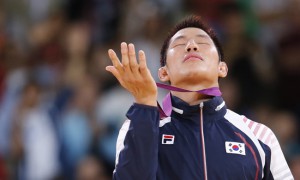Humanism and the Olympics: Why Do Athletes Thank God?

By Cameron Stewart
There are many bits of Olympian trivia floating about, ranging from the well known (ancient athletes competed in the nude) to the obscure (gold medals haven’t been solid gold since 1912), but one widely-acknowledged fact was that the Olympics originated to worship the Greek deity, Zeus. Athletes took part in sports that they envisioned their gods taking part in – racing, wrestling, and jumping – in order to honor the gods. Although briefly suspended, the Olympics would become a tradition again after the absence of the Olympics was partially blamed for a plague and years of war. These ancient Olympics would eventually end after the Romans’ takeover of the Greeks and the destruction of the Greek temples.
The Olympics would not take place internationally until 1896. A movement called muscular Christianity, or the belief that strengthening one’s body could also strengthen faith influenced the figurehead of this revival, Baron Pierre de Coubertin. Recently, pastor Henry Brinton wrote an article published in USA Today on the need for the Olympics to reconnect to their religious roots, suggesting that the opening ceremonies hold “a celebration of religions” in addition to the parade of nations. And though there is no official connection between modern Olympics and religion, it certainly has not stopped athletes from giving credit to their deity of choice.
With a bit of thought, it’s awfully ironic that these athletes are so adamant about thanking their god for helping them win. Was God helping both the Christian and Jewish athlete? How about the Muslim one? Where is the line drawn at helping and not helping? If God decides not to help an athlete, are they doomed to lose?
More concerning is the idea of a God using their infinite powers to influence something like an athletic competition. There are people dying of various terminal illnesses and entire countries in poverty and starving, but God would rather help Gabby Douglas stick a landing or Tim Tebow throw a fourth-quarter touchdown.
Also a bit concerning is what is often left out of the thanking. God gets the first thanks, and people who have actually made a difference in the athletes’ development get the short stick. Trainers, teammates, coaches, friends, and family members, all of who have made a substantial positive impact on the athletes take a backseat to God.
One shouldn’t forget that scientific knowledge has also vastly improved athletes’ performances. A better understanding of how the body works, and how to care for it through nutrition and exercise can be attributed to always improving scores and times as the years progress.
Even a bit of self-congratulatory narcissism seems more appropriate than pandering to religion. These competitors have given up much of their lives to hard work and dedication to get to where they are, and although many are too humble, a simple “I’m proud of my hard work” is not out of line at all.
Perhaps Ryan Lochte (or an AT&T writer) put it best, in a recent television commercial: “Luck doesn’t get you to the Olympic games. You can’t wish your way onto the podium; you can’t buy it or hope for it. It’s not enough to dream about it. Luck didn’t get me to London. I swam here.” It really was Lochte’s hard work that put him where he is today, and he implicitly acknowledges that no matter how superstitious or religious he was able to be, the only things responsible for his success are his natural talent and hard work.
The Olympics bring people together from all over the world, united by their love for their respective sports and competition, but religion is creating a small proxy war through various athletes. Just as today’s Olympians have given up on worshipping Zeus, tomorrow’s should give up on thanking deities and instead be proud of their hard work and accomplishments.
Cameron Stewart is the summer 2012 communications and advocacy intern for the American Humanist Association. He is a student at American University in Washington, DC.
